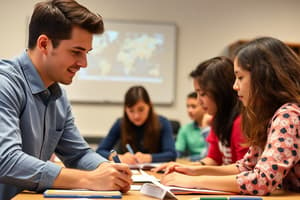Podcast
Questions and Answers
What happens to human memory of newly learned knowledge over time without review?
What happens to human memory of newly learned knowledge over time without review?
- Memory tends to halve within days or weeks (correct)
- Memory increases significantly after a few days
- Memory of new knowledge stays constant
- Memory fades quickly but stabilizes after one week
Which learning style is characterized by hands-on experience and practical engagement?
Which learning style is characterized by hands-on experience and practical engagement?
- Auditory learner
- Kinesthetic learner (correct)
- Reflector
- Visual learner
What should learners do frequently to combat the forgetting curve?
What should learners do frequently to combat the forgetting curve?
- Wait until they finish studying to revise
- Review the material repeatedly at every opportunity (correct)
- Focus only on difficult materials
- Take long breaks between study sessions
Which statement about learning styles is true?
Which statement about learning styles is true?
What factor does NOT influence the speed at which forgetting occurs?
What factor does NOT influence the speed at which forgetting occurs?
What is the primary purpose of reflection in learning?
What is the primary purpose of reflection in learning?
What is the first step in the reflective cycle?
What is the first step in the reflective cycle?
Why is participation in non-academic activities considered beneficial?
Why is participation in non-academic activities considered beneficial?
What aspect of learning at university is emphasized as different from secondary school?
What aspect of learning at university is emphasized as different from secondary school?
What key approach should students take to achieve deep learning?
What key approach should students take to achieve deep learning?
What distinguishes undergraduate education from secondary education regarding sources of information?
What distinguishes undergraduate education from secondary education regarding sources of information?
What is the primary goal of undergraduate education in a professional course?
What is the primary goal of undergraduate education in a professional course?
How is the approach to learning described between secondary school and undergraduate education?
How is the approach to learning described between secondary school and undergraduate education?
Which aspect is crucial in defining 'learning' as mentioned in the content?
Which aspect is crucial in defining 'learning' as mentioned in the content?
What is a common misconception about study habits in secondary education compared to undergraduate education?
What is a common misconception about study habits in secondary education compared to undergraduate education?
What is a key characteristic of adult learners regarding their motivation to learn?
What is a key characteristic of adult learners regarding their motivation to learn?
How does deep learning contribute to knowledge retention compared to superficial learning?
How does deep learning contribute to knowledge retention compared to superficial learning?
What percentage of information do we remember from doing activities according to the content?
What percentage of information do we remember from doing activities according to the content?
Which of the following methods is NOT suggested for shifting information from short-term to long-term memory?
Which of the following methods is NOT suggested for shifting information from short-term to long-term memory?
What is essential for successful deep learning according to the content?
What is essential for successful deep learning according to the content?
What role do past experiences play in adult learning?
What role do past experiences play in adult learning?
When is the best time to revise information to aid memory retention?
When is the best time to revise information to aid memory retention?
Which of the following activities is recommended to enhance active learning?
Which of the following activities is recommended to enhance active learning?
Which characteristic is associated with visual learners?
Which characteristic is associated with visual learners?
What is a key enhancement technique for auditory learners?
What is a key enhancement technique for auditory learners?
Which characteristic best describes kinesthetic learners?
Which characteristic best describes kinesthetic learners?
How do verbal (linguistic) learners typically express their understanding?
How do verbal (linguistic) learners typically express their understanding?
What best characterizes logical (mathematical) learners?
What best characterizes logical (mathematical) learners?
Which statement about social (interpersonal) learners is true?
Which statement about social (interpersonal) learners is true?
Which approach is least effective for visual learners?
Which approach is least effective for visual learners?
Which strategy do auditory learners find most beneficial?
Which strategy do auditory learners find most beneficial?
What do kinesthetic learners often struggle with when learning?
What do kinesthetic learners often struggle with when learning?
What enhances learning for logical (mathematical) learners?
What enhances learning for logical (mathematical) learners?
Study Notes
Learning and Studying
- Learning is the process of acquiring knowledge, skills, preferences, and understanding.
- Learning should be demonstrable.
- University learning is different from secondary school learning.
- In university, learning sources expand beyond teachers and books to include the internet and peers.
- University goals transcend passing exams, focusing on professional training and lifelong learning.
- University assessment includes written exams, practicals, oral exams, and clinical exams.
Deep and Active Learning
- Superficial learning is quickly forgotten and doesn't translate into practical application.
- Deep learning is important for lifelong learning and adaptability.
- Active learning engages with information through interactions like summarizing, drawing diagrams, attempting practice papers, and actively engaging with concepts.
- Revisit, repeat, and revise materials to move information from short-term to long-term memory.
- The forgetting curve illustrates the rapid decline in memory over time.
- Frequent review significantly combats this decline.
Learning Styles
- Learning styles describe how individuals perceive and process information.
- Common learning styles include:
- Visual: Learn by seeing
- Auditory: Learn by hearing
- Kinesthetic: Learn by doing
- Verbal: Learn through language
- Logical: Learn through reason
- Social: Learn through interaction
- Each style has specific characteristics and methods for enhancement.
Reflective Learning
- Reflective learning involves revisiting experiences to gain insights and improve future performance.
- The reflective cycle consists of:
- Identifying the learning event
- Reflecting on what was learned
- Identifying gaps in knowledge
- Developing strategies to fill those gaps
- Gathering evidence for learning and change
Holistic Education
- Participation in non-academic activities provides valuable learning opportunities.
- These activities contribute to developing skills in communication, teamwork, leadership, decision-making, organization, management, attitude, and personal development.
- Engaging in diverse activities promotes holistic education.
Studying That Suits You
Use AI to generate personalized quizzes and flashcards to suit your learning preferences.
Related Documents
Description
Explore the principles of university learning and the importance of deep and active engagement with study materials. This quiz will delve into the differences between university and secondary school learning, emphasizing techniques that foster long-term retention and adaptability. Assess your understanding of effective learning strategies and their practical applications.



